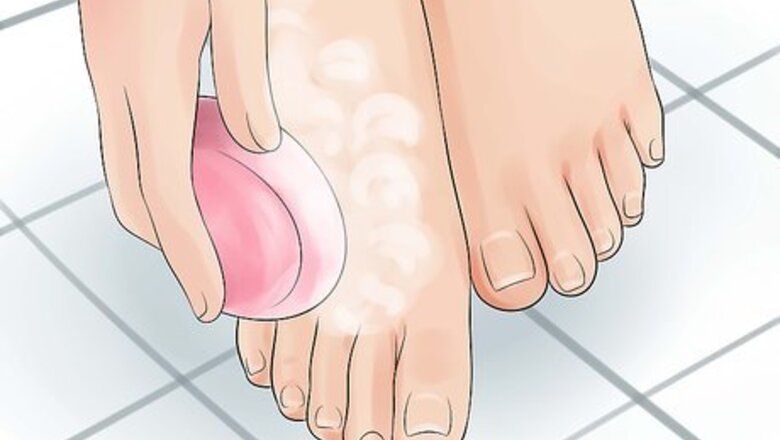
views
Preventing Foot Odor
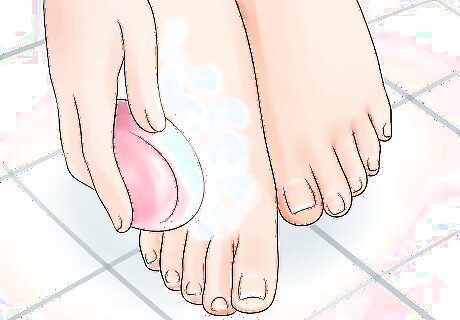
Bathe your feet daily. To keep your feet from smelling, practice good foot hygiene. Wash your feet every day with warm water and antibacterial soap. This removes dirt, sweat, and odor causing bacteria. Make sure to take special care to wash your feet when taking a bath or shower. Many times people forget to wash their feet, or do it quickly. Your feet need as much, if not more, attention as the rest of your body. Wash between your toes and around the nail beds. These are places where bacteria can grow. If your feet smell, try washing your feet multiple times a day. Once in the morning, once at night, and once after you work out or get extra sweaty.
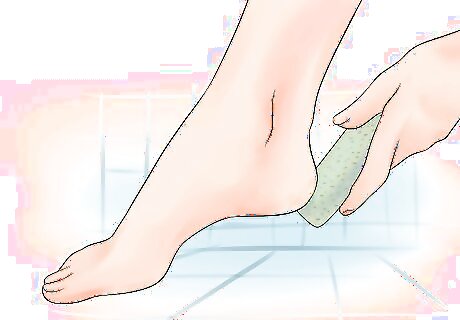
Exfoliate your feet. Getting rid of the dead skin can help reduce the smell. Scrub your feet at home with an exfoliating scrub or a pumice stone, or treat yourself to a pedicure. Also keep your toenails clean and trimmed to reduce bacteria. Moisturize your feet with lotion to keep them soft and healthy. Try lotions with fragrances like lavender, peppermint, or tea tree oil to help combat odors.
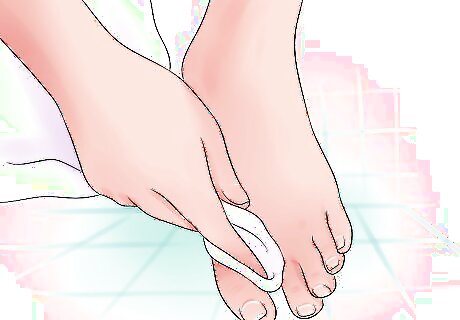
Keep your feet dry. Foot odor is caused by bacteria, which breed and thrive in moist areas. As you wear sweaty, damp socks and shoes, bacteria grow and eventually start clinging to the feet and causing odor. By keeping your feet dry, you remove the moisture where the bacteria would live. Dry your feet off really well after you shower. Make sure to get all of your feet, including the area between the toes. Wipe between your toes with rubbing alcohol after drying them. The rubbing alcohol helps dry out the skin between the toes. Don't use alcohol if you have open sores, cracked skin, or dry feet.
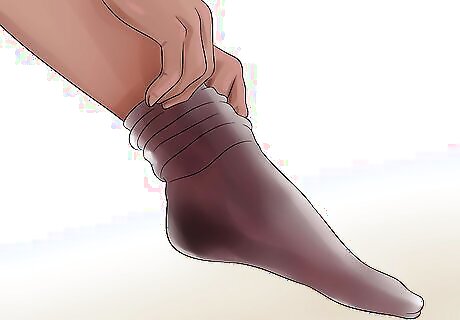
Wear socks. When you can, wear socks with your shoes. Socks absorb moisture, so when you skip them, the sweat transfers to your shoes or gets trapped between your toes. When you wear boots and sneakers, always wear socks. Socks don't work well with pumps or ballet flats. Buy the small no-show socks designed to be hidden when worn with dress shoes. These socks can be purchased at major retailers.
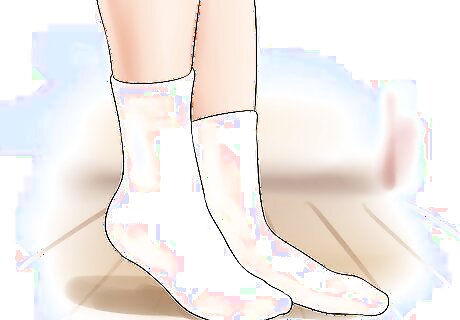
Wear the right socks. The socks you wear can make a difference in the smell of your feet. Always wear a fresh pair of socks; don't rewear socks multiple days in a row. When choosing socks, choose synthetic socks. Be wary of cotton socks. They absorb moisture, which could make your feet soggy, and therefore, smelly. Try moisture-wick socks that pull moisture away from the skin, or feet-fresh athletic socks that contain ventilation. You can also purchase antibacterial socks that have ingredients that help prevent bacteria from growing. No matter if you wear synthetic or cotton socks, make sure they are breathable fabric. Turn your socks inside out when you wash them to clean the dead skin and moisture from the inside.
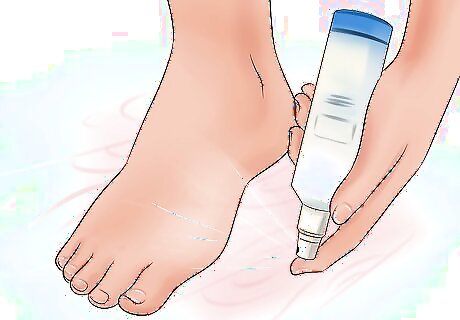
Use antiperspirant on your feet. Antiperspirants contain chemicals that help reduce sweating. Deodorants, on the other hand, only mask the smell, so steer away from those. Spread antiperspirant on your feet before you go to bed. This allows the product enough time to soak into your skin so it will start to work the next day. Don't forget to place it between your toes, where a lot of sweat and odor begins. You can also place antiperspirant on your feet before putting on your shoes the next morning. Just make sure not to only put it on in the morning, because if your feet start to sweat right away, it could remove the antiperspirant.
Preventing Shoe Odor
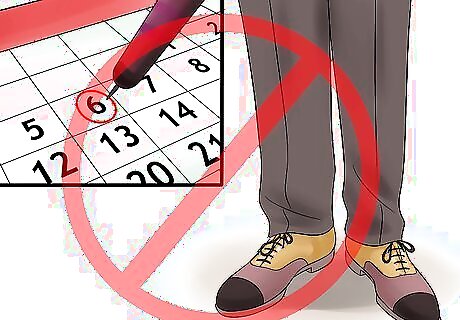
Don't wear the same pair of shoes two days in a row. By alternating your shoes, you allow at least 24 hours for the shoes to dry. This reduces moisture, which is where the odor causing bacteria dwells. If you exercise daily, buy two pairs of shoes. One of the main causes of foot sweat is exercise. Athletic shoes are a common odor site. Alternate between pairs throughout the week, making sure to give each pair plenty of time to completely dry before exercising in them again.
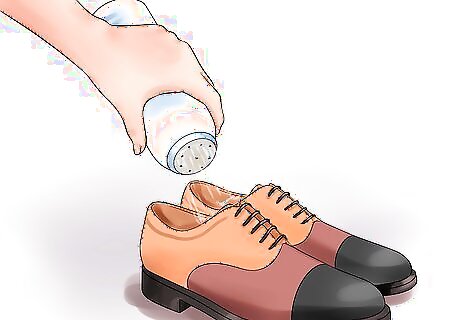
Sprinkle your shoes with odor-fighting powder. When you are not wearing your shoes, sprinkle baking soda or talcum powder onto the soles. Baking soda is believed to be effective in neutralizing odors. It neutralizes the pH of sweat and reduces bacteria. It also helps absorb moisture. You can put baking soda into your shoes between wears, and even brush it on your feet before putting on your socks. You can also brush your feet with cornstarch before wearing shoes to absorb and soak up moisture. You might also try rubbing antibacterial cream on your feet to reduce the amount of bacteria.
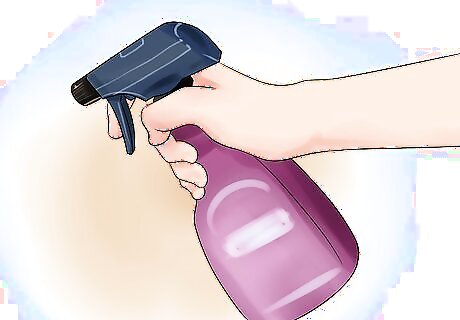
Try an antibacterial deodorizing spray. Spray some deodorizing or disinfecting spray into your shoes to cut down on the odor. You might also try washing out the soles and insides of your shoes with rubbing alcohol.
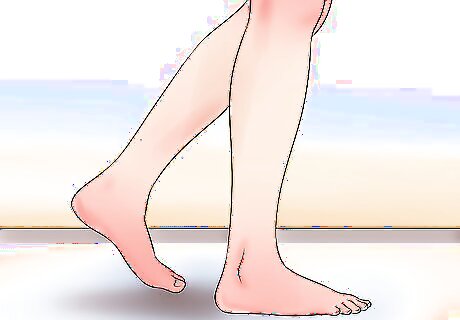
Go barefoot. When at home, let your feet be free. Don't wear socks or shoes unless you have to. If your feet are cold, wear clean socks that are thick and soft because they will help draw the moisture away from your feet.
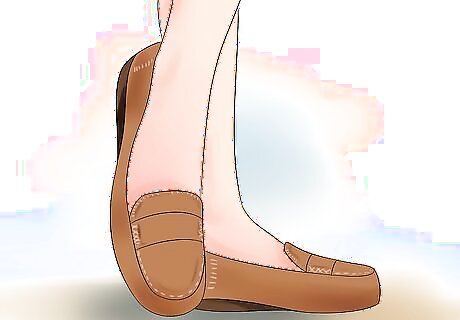
Wear the right shoes. One major cause for foot sweating is shoes that don't breathe. When choosing shoes to wear, choose ones that breathe. Steer clear of plastic and rubber shoes because they do not breathe. Get shoes made of leather, canvas, or mesh, which provide airflow for your feet. Wear open-toed shoes when possible. Open-toed heels, sandals, and flip-flops allow plenty of airflow to your feet, which keeps the sweating to a minimum.
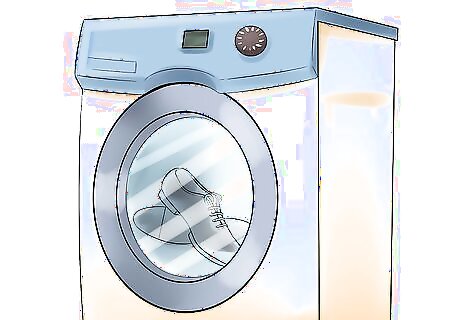
Wash your shoes regularly. If you have shoes that can be thrown into the washing machine, wash them every week or two. Add some baking soda to the wash to help with the odor. Wash your socks regularly. Add baking soda or bleach to the cycle to help cut odor. Don't dry sneakers in the dryer. Instead, place them on top of the dryer and let the heat from the dryer help dry them. You can also let them air dry. If you can't wash your shoes, wash them out with hot water and baking soda.
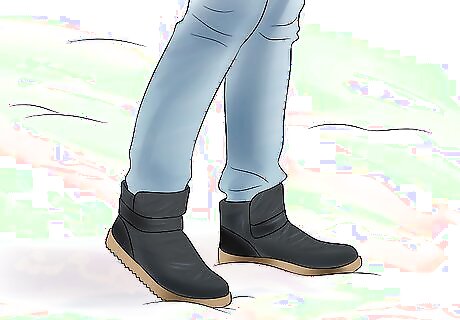
Avoid getting your shoes wet. When you go out into the snow or rain, make sure to wear proper shoes to avoid soaking your shoes. If you get your shoes wet, make sure to dry them properly. Otherwise, the shoes might sour. Dry the shoes on top of the clothes dryer, with a hair dryer, or in the sunlight. Make sure to dry them as soon as possible so they don't sour. If you know you have to be out and can't wear waterproof shoes, think about purchasing plastic shoe covers. These shoe protectors can be purchased at major retailers.
Treating Your Smelly Feet With Home Remedies
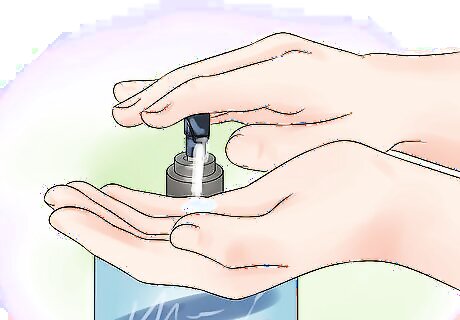
Squirt hand sanitizer on your feet after washing. After washing your feet with soap and water, think about squirting antibacterial hand sanitizer on your feet. This might help keep bacteria from growing on your feet.
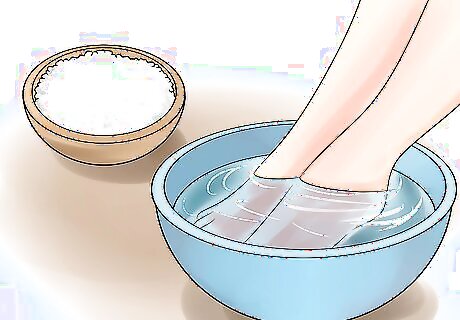
Soak your feet in Epsom salt. Epsom salt may help neutralize odor and helps fight bacteria. Dissolve 1/2 cup of Epsom salt into 8 cups of warm water. Soak your feet for 30 minutes daily. Don't rinse the salt from your feet afterwards, just dry your feet thoroughly. This works well if you do it before bed and don't put socks on afterwards.
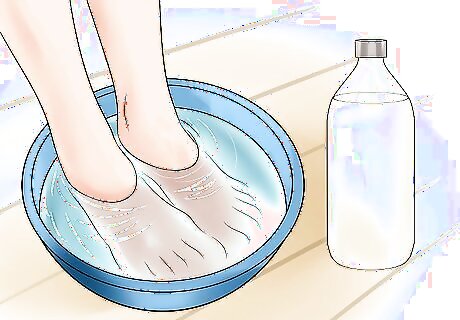
Wash your feet with vinegar. Vinegar is an acid that creates an environment where bacteria cannot live. Mix 1/2 cup of white or apple cider vinegar with 6 cups of hot water. Soak your feet for 10-15 minutes. Wash your feet with soap and rinse well afterwards to remove the vinegar smell. If vinegar is left on your skin, it could cause a chemical burn.
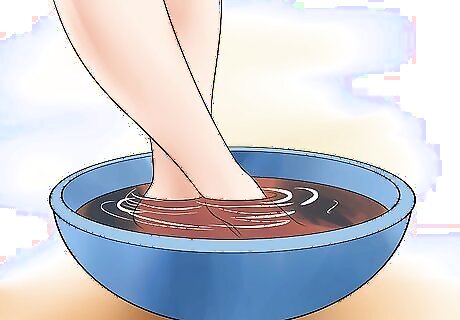
Mix up a black tea bath. Many people swear by the folk remedy of soaking your feet in black tea to remove foot odor. The tannic acid in tea is believed to deter bacteria by creating an unfriendly environment. Steep 5 black tea bags in boiling water. When the tea has steeped, mix with 4 cups of cool to warm water - you want to make sure not to burn your feet. Soak your feet for 20 minutes daily. An alternative is to use green tea, which is also thought to destroy the bacteria.
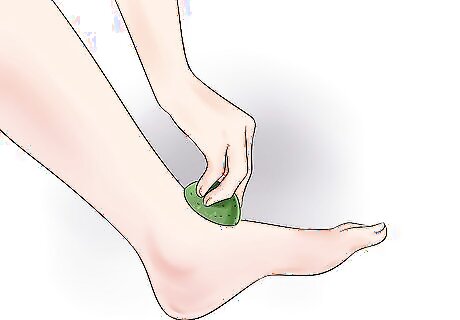
Rub your feet with a lime. Cut a lime in half and rub each half over your feet before bed. Rinse off the lime juice to prevent skin irritation. Let it dry completely. The acid in the lime may prevent bacteria from growing. However, limes are not guaranteed to reduce foot odor. You can also use a lemon instead of a lime. You might consider mixing the lemon or lime with baking soda and soaking your feet instead. Both limes and lemons can cause skin irritation. If your skin is sensitive, you may want to try applying diluted lime or lemon water to your feet instead of the juice.
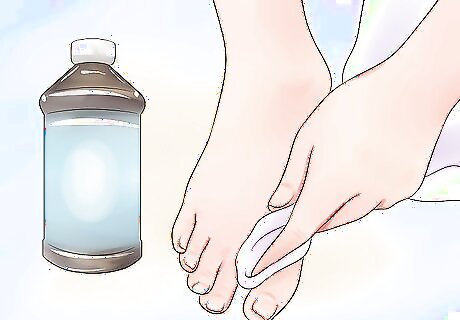
Try hydrogen peroxide. Mix 1 teaspoon of hydrogen peroxide with 1 cup of water. Place the mixture on a washcloth and wipe it over your feet. This may help eliminate some of the bacteria.




















Comments
0 comment